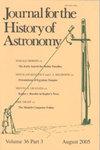1668年北京的预测与政治:危机时期的耶稣会天文学家及其技术资源
IF 0.3
3区 哲学
Q3 HISTORY & PHILOSOPHY OF SCIENCE
引用次数: 0
摘要
1668年12月下旬,康熙康熙 皇帝(1662–1722年在位)要求耶稣会天文学家费迪南德·韦比斯特(1623–1688年在位)提供可公开验证的证据,证明耶稣会士引入中国的西方天文系统是准确的。作为回应,Verbest提出,他和他的中国对手应该被设定一项任务,预测给定长度的侏儒在给定时间、给定日期投射的阴影的长度,他的建议被接受了。这项实验性试验的成功对耶稣会在中国传教的未来至关重要。在连续三天中午重复审判后,Verbest被认为成功地展示了西方方法在这方面的优势。在本文中,我们对Verbest预测侏儒阴影的方法进行了详细的技术分析,并将其技术来源追溯到他前往中国之前在欧洲的天文学研究。在这项研究的过程中,我们讨论了17世纪中期欧洲天文学技术的变化,这些变化在他的预测任务中发挥了决定性作用。由于这一分析,我们能够解释Verbest预测的某些先前令人困惑的特征,作为他对审判所处的有争议的环境的理性回应。本文章由计算机程序翻译,如有差异,请以英文原文为准。
Prediction and politics in Beijing, 1668: A Jesuit astronomer and his technical resources in a time of crisis
In late December 1668 the Kangxi 康熙 emperor (r. 1662–1722) asked the Jesuit astronomer Ferdinand Verbiest (1623–1688) to give publicly verifiable proof that the western astronomical system introduced to China by the Jesuits was accurate. In response Verbiest proposed that he and his Chinese opponents should be set the task of predicting the length of the shadow cast by a gnomon of a given length at a given time on a given day, and his suggestion was accepted. Success in this experimental trial was vital to the future of the Jesuit mission in China. After repeating the trial at noon on three successive days, Verbiest was judged to have succeeded in showing the superiority of western methods in this respect. In this paper, we provide a detailed technical analysis of the methods used by Verbiest to make his predictions of gnomon shadows, and trace the sources of his skills back to his astronomical studies in Europe before his departure for China. In the course of this investigation, we discuss changes in European astronomical techniques up to the mid 17th century that played a decisive role in his predictive task. As a result of this analysis, we are able to explain certain previously puzzling features of Verbiest’s predictions as a rational response on his part to the contentious circumstances under which the trial was conducted.
求助全文
通过发布文献求助,成功后即可免费获取论文全文。
去求助
来源期刊

Journal for the History of Astronomy
地学天文-科学史与科学哲学
CiteScore
0.50
自引率
25.00%
发文量
44
审稿时长
>12 weeks
期刊介绍:
Science History Publications Ltd is an academic publishing company established in 1971 and based in Cambridge, England. We specialize in journals in history of science and in particular history of astronomy.
 求助内容:
求助内容: 应助结果提醒方式:
应助结果提醒方式:


